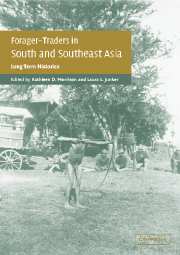Book contents
- Frontmatter
- Contents
- List of figures
- List of tables
- List of contributors
- Preface
- 1 Historicizing adaptation, adapting to history: forager-traders in South and Southeast Asia
- Part I South Asia
- Part II Southeast Asia
- 7 Introduction
- 8 Hunters and traders in northern Australia
- 9 Foragers, farmers, and traders in the Malayan Peninsula: origins of cultural and biological diversity
- 10 Economic specialization and inter-ethnic trade between foragers and farmers in the prehispanic Philippines
- References
- Index
7 - Introduction
Published online by Cambridge University Press: 22 September 2009
- Frontmatter
- Contents
- List of figures
- List of tables
- List of contributors
- Preface
- 1 Historicizing adaptation, adapting to history: forager-traders in South and Southeast Asia
- Part I South Asia
- Part II Southeast Asia
- 7 Introduction
- 8 Hunters and traders in northern Australia
- 9 Foragers, farmers, and traders in the Malayan Peninsula: origins of cultural and biological diversity
- 10 Economic specialization and inter-ethnic trade between foragers and farmers in the prehispanic Philippines
- References
- Index
Summary
At the time of European contact, both mainland and island Southeast Asia supported an amalgam of groups with extremely diverse economic orientations, levels of sociopolitical complexity, and linguistic and ethnic affiliations. The significant ecological diversity and geographic fragmentation characterizing Southeast Asia appear to have engendered a high level of economic specialization and intensive inter-ethnic exchange relations between various groups of tropical forest foragers, tribal swiddening populations, and complex chiefdoms and kingdoms focused on maritime trade and intensive rice farming (Figure 7.1). The historic period configurations of such inter-ethnic trade systems have been well documented through early texts associated with literate kingdoms of the late first and early second millennium AD, Chinese trade records and later European histories (L. Andaya 1975; Hall 1985:1–20, 80–9, 1992:257–9; Junker 1999:239–59; Miksic 1984; Wheatley 1983; Wolters 1971:13–14).
Interior hunter-gatherer populations, including a number of groups known as Semang on the Malay Peninsula, the Punan or Penan of Borneo, the Kubu and other interior groups of Sumatra, the Agta, Ata, Batak, and various other groups of the Philippines, the Andaman Islanders, and the Tonutil of Maluku (also known as the Moluccas or Spice Islands), were well known to literate lowland farming populations and traders as the collectors of tropical forest products (such as hunted meat, honey, rattan, resins, and spices) that were much desired by lowland agriculturalists and their foreign trade partners at maritime trading centers.
- Type
- Chapter
- Information
- Forager-Traders in South and Southeast AsiaLong-Term Histories, pp. 131 - 166Publisher: Cambridge University PressPrint publication year: 2002
- 6
- Cited by



